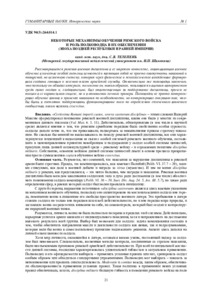Пожалуйста, используйте этот идентификатор, чтобы цитировать или ссылаться на этот ресурс:
https://elib.psu.by/handle/123456789/1442Полная запись метаданных
| Поле DC | Значение | Язык |
|---|---|---|
| dc.contributor.author | Телепень, С. В. | ru_RU |
| dc.date.accessioned | 2014-03-10T13:03:52Z | - |
| dc.date.available | 2014-03-10T13:03:52Z | - |
| dc.date.issued | 2014 | - |
| dc.identifier.citation | Вестник Полоцкого государственного университета. Серия A, Гуманитарные науки: научно-теоретический журнал. – Новополоцк: ПГУ, 2014. - № 1. - С. 21-27. | ru_RU |
| dc.identifier.uri | https://elib.psu.by/handle/123456789/1442 | - |
| dc.description | Some Mechanisms of Teaching the Roman Army and the Commander Role of Their Guaranting (Age of Late Republic and Early Empire)/ S.V. Telepen', Kandidat Istoricheskih Nauk, Docent, Mozyrskij Gosudarstvennyj Pedagogicheskij Universitet Im. I.P. Shamjakina. С.В. Телепень - Кандидат Исторических Наук, Доцент, Мозырский Государственный Педагогический Университет Им. И.П. Шамякина. | en |
| dc.description.abstract | Рассматривается римская военная дисциплина в ее широком контексте, охватывающая военное обучение в качестве особой системы ценностей и являющая собой не просто совокупность наказаний и поощрений, но целостную систему, которая через физическое и психологическое воздействие формировала солдата готовым к несению тягот армейской службы. Относительно же полководца заключим, что поскольку он обладал империем, то именно он, таким образом, пользовался и высшим авторитетом среди своих солдат и, следовательно, был ответственным за поддержание дисциплины, причем не только в ее карательном смысле, но и в отношении личного примера. Полководец не просто контролировал обучение воинов и применял наказания по необходимости, но контролировал ситуацию так, чтобы быть в состоянии поддерживать функционирование того по определению сплоченного воинского сообщества, каким являлось exsercitus. = The Roman military discipline in its broader context includes military training as a particular system of values and represents not just a set of punishments and rewards, but the whole system, which is through the physical and psychological impact has formed a soldier ready to bear the burdens of military service. Regarding the commander conclude that because he had an empire, then was he so enjoyed and the highest authority among his soldiers, and therefore was responsible for the maintenance of discipline, not only in its punitive sense, but also in terms of personal example. The commander is not just controlled the training of soldiers and apply penalties as appropriate, but control of the situation so as to be able to support the operation of addition, by definition, a close-knit military community, which was exsercitus. | ru_RU |
| dc.language.iso | ru | ru_RU |
| dc.publisher | Полоцкий государственный университет | ru_RU |
| dc.relation.ispartof | Веснік Полацкага дзяржаўнага ўніверсітэта. Серыя А, Гуманітарныя навук | be_BE |
| dc.relation.ispartof | Herald of Polotsk State University Series A, Humanity sciences | en_EN |
| dc.relation.ispartof | Вестник Полоцкого государственного университета. Серия A, Гуманитарные науки | ru_RU |
| dc.relation.ispartofseries | Серия A, Гуманитарные науки;2014.- № 1 | - |
| dc.rights | open access | ru_RU |
| dc.subject | Исторические науки | ru_RU |
| dc.subject | История Рима | ru_RU |
| dc.subject | Римская армия | ru_RU |
| dc.title | Некоторые механизмы обучения римского войска и роль полководца в их обеспечении (эпоха поздней республики и ранней империи) | ru_RU |
| dc.type | Article | ru_RU |
| dc.identifier.udc | УДК 94(3):264.014.1 | ru_RU |
| Располагается в коллекциях: | 2014, № 1 | |
Файлы этого ресурса:
| Файл | Описание | Размер | Формат | |
|---|---|---|---|---|
| 21-27.pdf | 323.6 kB | Adobe PDF |  Просмотреть/Открыть |
Все ресурсы в архиве электронных ресурсов защищены авторским правом, все права сохранены.